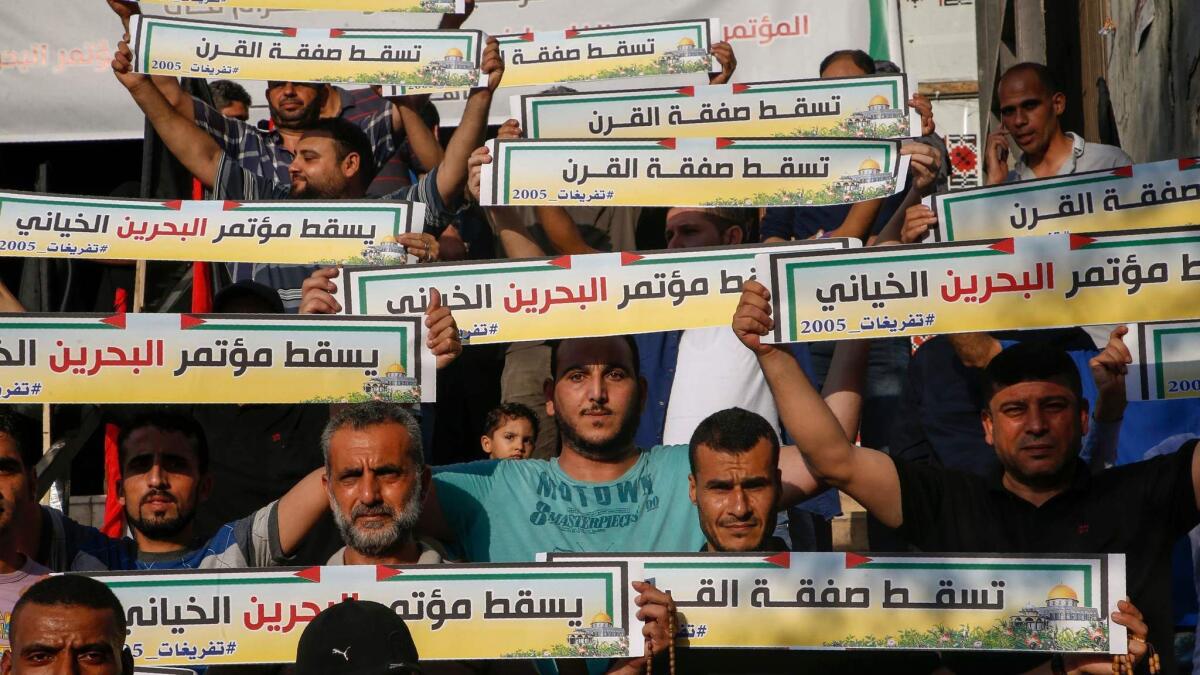Palestinians denounce Trump’s economic ‘Peace to Prosperity’ plan

The Trump administration kicked off an economic portion of its long-awaited plan for Arab-Israeli peace on Tuesday, amid intense denunciations from the Palestinian leadership.
Saying an improved economic situation was “a necessary precondition to resolving what was previously an unsolvable political situation,” White House senior advisor Jared Kushner opened the Peace to Prosperity workshop in Manama, Bahrain, pushing an agenda for growth.
“To be clear, economic growth and prosperity for the Palestine people are not possible without an enduring and fair political solution to the conflict, one that guarantees Israel’s security and respects the dignity of the Palestinian people,” Kushner said in a live broadcast of his opening speech. “However, today is not about the political issues, we’ll get to those at the right time.”
Palestinian leaders have long excoriated Kushner and other Trump administration officials for their political stance that heavily leans in favor of Israel and against Palestinians. Israel is a close ally of the United States.
Husam Zomlot, the head of the Palestinian Mission to the U.K. and a former ambassador to Washington, dismissed the conference as a way to legitimize Israel’s annexation of Palestinian territories.
“This is the most disingenuous, deceitful act by a state in a long time in the history of international relations,” said Zomlot in a phone interview Tuesday. “Their idea is that this is a real-estate deal, with Israel getting the property and the Palestinians getting the cash. The problem is that Palestine is not for sale.”
“We are not open to the world. We have no freedom of movement to leave the West Bank and the Gaza Strip. We have to get permits, fees, etc. … so as to be able to reach the eternal economy,” said Monther Hallak, who — along with his family — heads the West Bank Salt Co.
“If you want anything delivered in a week, it takes us two to three weeks…. Everything has to happen with Israeli permission. This is the problem,” he said in a phone interview Tuesday.
Like other Palestinian businessmen, especially those who presumably would benefit the most from the proposal, Hallak had boycotted the Manama conference. More than a month before the workshop, Palestinian business leaders Bashar Masri and Zahi Khouri rejected their invitations.
“Despite what those who have let you down in the past will tell you, President Trump and America have not given up on you,” said Kushner, looking into the camera in the live broadcast as he delivered “a direct message to the Palestinian people.”
“You can change your course for the positive if you’re willing to try new things and think outside the traditional box. Peace can only be achieved if it comes with a path for people to improve their lives … instead of blaming others for their current misfortune.”
The proposal, which was released during the weekend and comprises a 96-page economic plan, a 40-page overview and a website, has the potential to facilitate more than $50 billion in new investment over 10 years into infrastructure, education and governance projects in Palestinian territories and the region, the White House said.
But it has been criticized for eliding Israel’s impact on Palestinians’ daily life and its devastating effect on the Palestinian economy.
“The cause of our flailing economy is Israel’s occupation,” said Diana Buttu, a Haifa-based analyst and former legal advisor to Palestinian peace negotiators, in a phone interview Tuesday.
She added that, taken together with his statements lauding Israel’s policies, Kushner, “in his mind, thinks that we are incapable — not that denial of freedom is the problem.”
More to Read
Start your day right
Sign up for Essential California for news, features and recommendations from the L.A. Times and beyond in your inbox six days a week.
You may occasionally receive promotional content from the Los Angeles Times.







